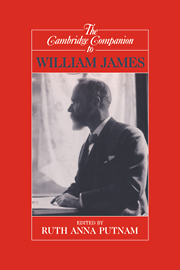Book contents
- Frontmatter
- Introduction
- 1 Pragmatism and introspective psychology
- 2 Consciousness as a pragmatist views it
- 3 John Dewey's naturalization of William James
- 4 James, Clifford, and the scientific conscience
- 5 Religious faith, intellectual responsibility, and romance
- 6 The breathtaking intimacy of the material world
- 7 James, aboutness, and his British critics
- 8 Logical principles and philosophical attitudes
- 9 James's theory of truth
- 10 The James/Royce dispute and the development of Jarnests "solution"
- 11 William James on religious experience
- 12 Interpreting the universe after a social analogy
- 13 Moral philosophy and the development of morality
- 14 Some of life's ideals
- 15 “A shelter of the mind”
- 16 The influence of William James on American culture
- 17 Pragmatism, politics, and the corridor
- 18 James and the Kantian tradition
- Bibliography
- Index
12 - Interpreting the universe after a social analogy
Intimacy, panpsychism, and a finite god in a pluralistic universe
Published online by Cambridge University Press: 28 May 2006
- Frontmatter
- Introduction
- 1 Pragmatism and introspective psychology
- 2 Consciousness as a pragmatist views it
- 3 John Dewey's naturalization of William James
- 4 James, Clifford, and the scientific conscience
- 5 Religious faith, intellectual responsibility, and romance
- 6 The breathtaking intimacy of the material world
- 7 James, aboutness, and his British critics
- 8 Logical principles and philosophical attitudes
- 9 James's theory of truth
- 10 The James/Royce dispute and the development of Jarnests "solution"
- 11 William James on religious experience
- 12 Interpreting the universe after a social analogy
- 13 Moral philosophy and the development of morality
- 14 Some of life's ideals
- 15 “A shelter of the mind”
- 16 The influence of William James on American culture
- 17 Pragmatism, politics, and the corridor
- 18 James and the Kantian tradition
- Bibliography
- Index
Summary
The last decade of William James's life was his most productive and distinguished, beginning in 1901-2 with his hugely successful Gifford Lectures, The Varieties of Religious Experience, and seeing the publication of virtually all of his strictly philosophical writings, with the notable exception of The Will to Believe. Although his output in this period was voluminous in pages and expansive in topic, James expressed dissatisfaction throughout the decade with his failure to produce a systematic work explicitly on metaphyics. From Varieties itself, which was to have had a philosophical complement, until the final effort, posthumously published as Some Problems in Philosophy, nearly every project of James's harbored both the hope and the disappointment of this desire to found and defend his radically empiricist Weltanschauung in a thoroughgoing manner.
In 1907 when an invitation to lecture at Oxford from the Hibbert Trust Committee arrived, James appears to have been more interested in working on a book to fulfil1 his promise for a metaphysics than in offering yet another series of public lectures. He found himself nonetheless unable to resist the temptation to attack philosophies of the absolute one last time. Originally titled “The Present Situation in Philosophy” and delivered in 1908, the lectures include a mixture of rousing polemical refutation and spirited constructive exposition, thus manifesting both interests.
- Type
- Chapter
- Information
- The Cambridge Companion to William James , pp. 237 - 259Publisher: Cambridge University PressPrint publication year: 1997
- 6
- Cited by

